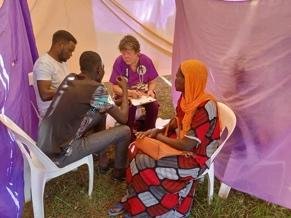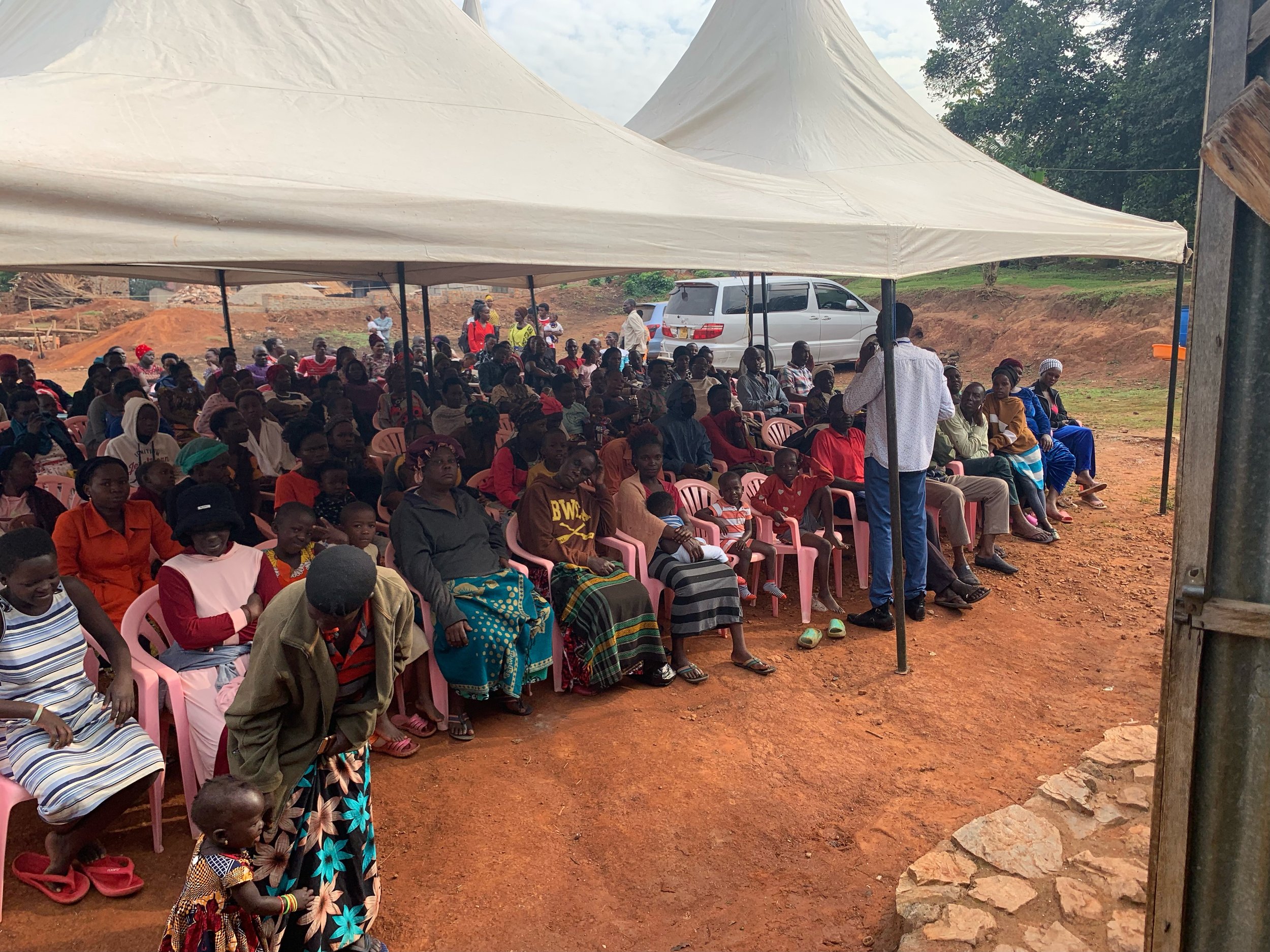2026 Team Deployment
Our next team deployment to Uganda will be
January 18 - February 2, 2026.
Please email us at healthempower21@gmail.com if you are interested in volunteering for the team
To join our team download and complete the application form: Coming in June
Once downloaded, you can use Adobe E-sign to complete the form electronically and return to the email above.
****A partial scholarship is available for an early career nurse (10 years or less of nursing experience) or or a nurse who has never been on a humanitarian deployment in a low resource setting. The application process will include an interview. The participant will be responsible for their own airfare. Email us for more information.****

News and Team Updates
Februrary 2024 Team Report
Dr. Leanne Converse and interpreter with patient. The interpreter, Andrew, is a nurse who just completed his education with financial support from an HEE team member.
Patient Waiting to be Seen in Clinic.
Health Education Empowerment - Uganda February 17-March 1, 2024
Donations
We received $7,530 in donations.
We spent $8,927 in direct patient care expenses and supplies for the adolescent girls’ classes.
$3,225 - medications & clinic supplies
$4,065 - patient referral & follow up care
$1,637 - AFRIpads & supplies for girls’ kits
Personnel
We had a high functioning team of experienced local volunteers and HEE volunteers.
● HEE Volunteers – 80% were experienced team members who had been to Uganda 1-9 times.
o 2 physicians
o 2 nurse practitioners
o 4 registered nurses
o 1 EMT
● In addition, local nurses and dentists worked in the clinic.
Clinics
● We saw 657 patients during seven days of clinic in Kawempe and Nangaiza. This does not include patients seen only for glasses or dental care.
● Common complaints included back pain, cough, headache, abdominal pain, and hernias.
● Malaria continues to be a significant problem for adults and children and 66% of malaria tests performed were positive. This translated to 43.4% of the patients seen having malaria.
● We distributed:
o 213 courses of malaria treatment
o 1,296 worm pills
o 207 pairs of reading glasses
Referrals
● HEE pays 80% of the cost of referral care and the patients make arrangements to pay the remaining 20%
o All Saints Buchangandi Clinic in Goli Goli
▪ 18 patients for surgery (hernia, lipomas, etc.)
▪ 4 patients for laboratory tests
o Patients referred for diagnostic tests (other than GoliGoli) = 2
o Patient referred for inpatient care = 1 (pre-eclampsia)
o Patients referred to CURE Uganda = 2 (spina bifida; neurologic abnormality in child)
o Patient referred to CoRSU hospital for surgery for syndactyly = 1
Education
● Medical minute sessions were held each morning before clinic started for the translators to present an educational topic to their peers. Topics included handwashing, malaria, hypertension, domestic violence, and back pain causes and treatment.
● Over the 7 days of clinic, group education was offered about 5 times per day to patients waiting to be seen in clinic. About 25 topics were taught, including malaria, handwashing, fever, and rehydration. Overall, over 600 patients listened to group education, some hearing multiple topics in a given day.
● 5,000 condoms were distributed to about 500 patients waiting to be seen in clinic and to volunteers. Several group classes were held to teach about the purpose of condoms and how to use them correctly. Condoms were obtained from the Uganda Ministry of Health at no cost.
● One education session was held for school-age children. They were taught about handwashing and mouth hygiene. Approximately 100 children attended the class. They received toothbrushes and soap and were treated to donuts.
● Five classes were held in Nangaiza for adolescent females. The goal of these classes is to encourage the girls to stay in school. Topics included feminine hygiene, using a washable feminine hygiene kit, sex education, and condom use. About 350 girls attended and received a feminine hygiene kit with re-usable pads, underwear, soap, and other items. A class was held by Evelyn (a local nurse volunteer) with community help to teach the girls how to sew their own pads. About 150 girls attended. The class was very successful!
● Two classes were held for pregnant women and new mothers: Taking Care of Yourself During Pregnancy & Newborn Care. The nursing director from a local clinic taught the class. About 75 women attended.
● Seven classes were held for the grandmothers (JaJas) and about 80 women attended in total. The group selected the topics they wanted to learn more about including such topics as domestic violence, menopause, and breast health. Each Jaja received a bracelet that said “Jaja Power.”
Scholarships
Scholarships to help Ugandans become nurses, physicians, and clinical officers help make a lasting impact on the communities we serve. Over the years, team members have sponsored several students. This year we have identified two for support from H.E.E. Their stories are below. If you would like to donate toward their education, please use the “Donate” button on the homepage.
Emma in Clinic.
Emma leaving clinic.
Emmanuel (Emma) Botte, has been a medical Clinical Officer since August of 2016. He works at the All Saints Buchanagandi Health Centre in Goli-goli, Uganda. He is from Nangaiza (part of the Goli-goli county) and intends to continue working in this underserved area. Clinical officers can see patients and prescribe medications and treatments but cannot perform invasive procedures. There is a scarcity of trained medical personnel, particularly physicians, in Uganda and the role of Clinical Officer allows the provision of primary care in rural areas.
Kibuku district (where Nangaiza and Goli-goli are located) in 2020 had a population of 250,600 and was served by only two medical doctors. Goli-goli subcounty in 2020 had a population of 9,900 with no physician. Physicians make monthly visits but cannot possibly meet the needs of the people in this rural community.
In 2019 Emma Enrolled in Kampala International University medical school and is currently in the third year of the five years of study. As a physician, Emma will be able to provide medical as well as surgical care. He will be licensed to perform surgeries such as Cesarian sections, herniorrhaphies, appendectomies, D & C, hysterectomies, and other surgeries commonly needed in the rural areas.
After graduation, Emma intends to continue working in his home community of Nangaiza and Goli-goli. The average salary of a Ugandan Clinical Officer is $4,200 US dollars. Tuition is $1,030 US dollars each term and Emma has three terms left. Unlike the United States, where students can take out loans and pay the university later, in Uganda the money must be paid up front at the beginning of each term.
HEE is committed to helping Emma reach his goal of becoming a Medical Doctor. His expertise and knowledge will bring sustainable health care and health education to the people in the Goli-goli subcounty.
2024 Donations
We were fortunate to receive $7,530 in donations for the team. This money, in addition to money received from team members was used for:
● $4,065 for patient care, including surgeries, at local healthcare facilities. Additional bills are pending from CURE and more patients may be referred for care if there a surplus funds.
● $3,225 for medications & supplies used in clinic.
● $1,637 to purchase reusable feminine hygiene pads (Afripads) and locally sewn cloth bags for girls’ hygiene kits.
In 2021 and 2022 we were unable to travel to Uganda as a team and instead solicited donations to support the entities we typically work with while in country. A significant portion of the money went to the GoliGoli clinic. Hellen Adengo, the clinic director, sent us a report and these photos. They used the money we sent for the following initiatives:
Community outreach about malaria, Covid -19 vaccination, family planning, routine immunization for children, and HPV vaccination to young girls.
Oxygen cylinders and regulators. Previously there was no oxygen at the clinic!
Treatment support to the elderly and other disadvantaged people.
To improve infection prevention, they bought color coded waste bins for waste segregation
Oxygen tanks are black with a white shoulder in most of the world. North America may be the only place where they are green.











